Talent Development

Safe and Healthy Work Environment
Safe Workplace
Policies and Systems
CTCI's HSE policies' focus is on "Total Safety." It applies to the due diligence process at our operation bases, project sites and merger & acquisition processes. We require all employees and workers to abide by HSE policies and procedures on entering its plant facilities. The policy is also communicated to our suppliers and JV partners, to ensure a safe working environment and protect the health of employees and workers. This policy is regularly submitted to the board of directors for review, and signed by the Chairman, President, and Heads of each Business Unit, showing our commitment to HSE and sustainable development.
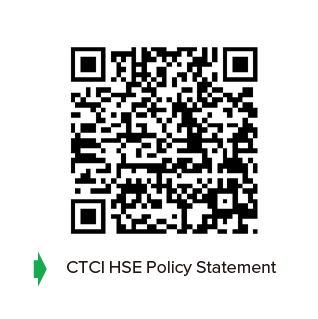

Milestones in CTCI's Occupational Safety and Health Management System
CTCI continues to maintain the effectiveness of ISO 14001 & ISO 45001 management system verification, which covers the first and second headquarters buildings of CTCI Corporation and all project sites, with a coverage rate of 100%. In compliance with Taiwan’s Occupational Safety and Health Management Regulations, CTCI has also established Taiwan Occupational Safety and Health Management System (CNS 45001), and received the certificate. CTCI has set an Occupational Safety and Health Committee, whose composition, meeting frequency, and meeting contents comply with Taiwan's "Occupational Safety and Health Management Measures." Besides, an HSE review meeting is held annually, to review HSE implementation and industrial safety performance, ensuring the effective operation of the management systems. CTCI’s safety and health-risk assessment follows the provisions of ISO 45001: 2018. It implements action plans for all risks rated as medium or above, aiming to eliminate hazards and minimize risks. When corrective and preventive measures are proposed in the project, it is also necessary to carry out hazard identification and risk assessment again. In the process of reviewing organizational background, CTCI assesses risks and opportunities associated with internal and external factors, and develops corresponding strategies and action plans in all aspects including management system, compliance obligations, risk-management procedures, external communication, office operating environment and resources, health management, operations, and operational controls. CTCI stipulates in the HSE Manual that "when an immediate danger is encountered in the course of conducting business, one may stop working and retreat to a safe location without jeopardizing the safety of other workers." The Manual also has laid down reporting procedure related to occupational hazards and dangers, allowing workers to report events at once to the immediate supervisor, to reduce the related risk impact.
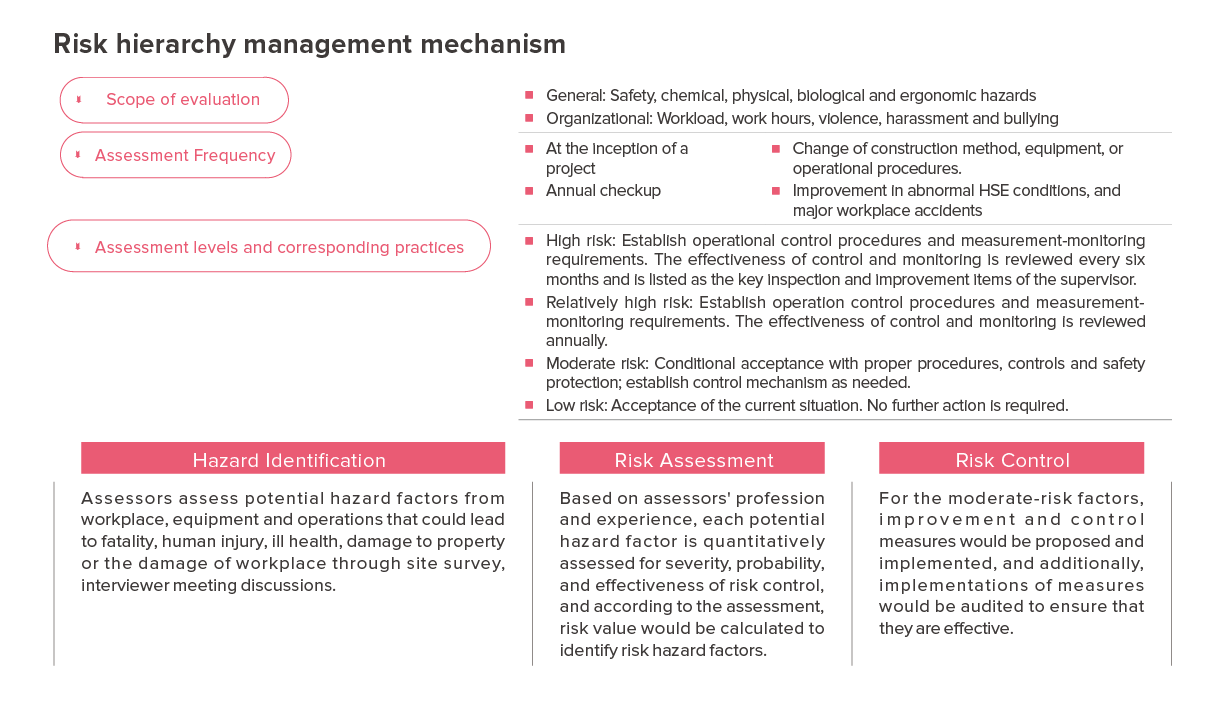

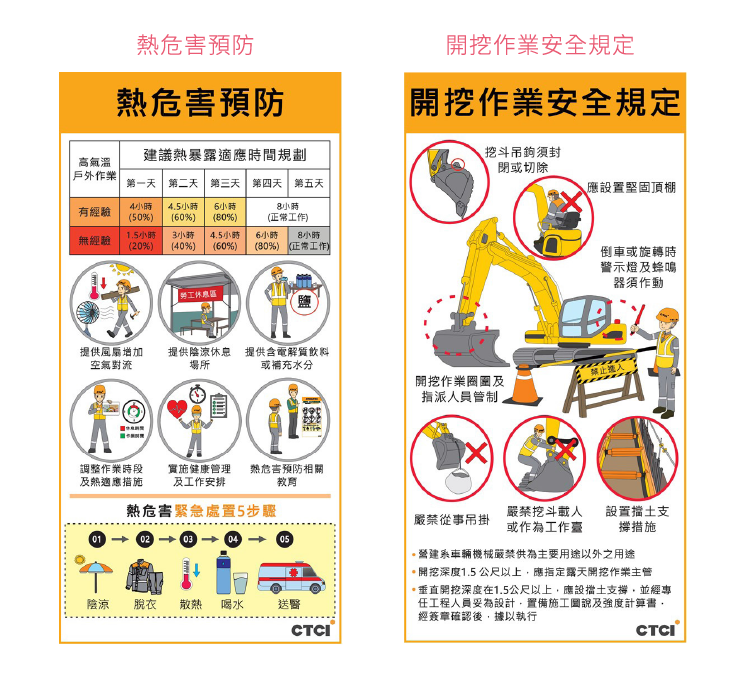

Construction Safety and Quality
Since near-miss incidents are considered significant indicators of potential risks, CTCI employs an internal HSE Management System to handle the reporting and corrective actions for near-miss incidents from both CTCI headquarters and all project sites, overseeing project teams in reporting any near-miss incidents. In 2024, a total of 99 near-miss incidents were reported. Various stakeholders, including HSE Management Department, construction personnel, safety personnel, and subcontractors, would irregularly participate in review meetings for these reported incidents. The meetings aimed to identify potential hazards with higher occurrence frequencies among these incidents and then develop Lesson & Learned. These lessons are incorporated into toolbox meetings at construction sites, with training materials regularly updated and reinforced through site-wide awareness campaigns. CTCI has been promoting Behavior Based Safety (BBS) Management for years to ensure that all employees take responsibility for safety and understand how unsafe behaviors can impact the company's safety performance. Additionally, CTCI has implemented the "BBS Observation" app at project sites to facilitate observation, recording, and efficient statistical analysis. This initiative involves frontline workers, including both CTCI personnel and subcontractors' employees. For example, on-site HSE personnel are required to compile weekly observation results using the app to enhance safety management across various job categories. Regular BBS HSE review meetings are held at project sites to analyze high-risk observations, identify causes, and propose corrective actions.
Total HSE Culture
We deeply understand that "Total Safety" requires the efforts of all levels, and establishing an HSE culture is a long-term process that requires everyone's participation. This involves comprehensive changes in values, attitudes, behaviors, and systems, we are committed to promoting the participation of all employees in HSE activities, and continuously internalizing HSE awareness at all levels. Total HSE Evaluation Process To enhance HSE awareness among all employees, we regularly conduct Total HSE Evaluations. These assessments help instill proper HSE knowledge, promote safe behaviors and attitudes, and engage those not directly involved in HSE, including department heads and project members. The evaluation covers three key areas: HSE policy commitment, basic concepts, procedural updates, current events, and practical application. Questions are tailored based on the audience. Results and statistics are presented in the company’s HSE management meetings and serve as a basis for future training and promotional campaigns, with the goal of continuously improving HSE management and enhancing employee safety competence.
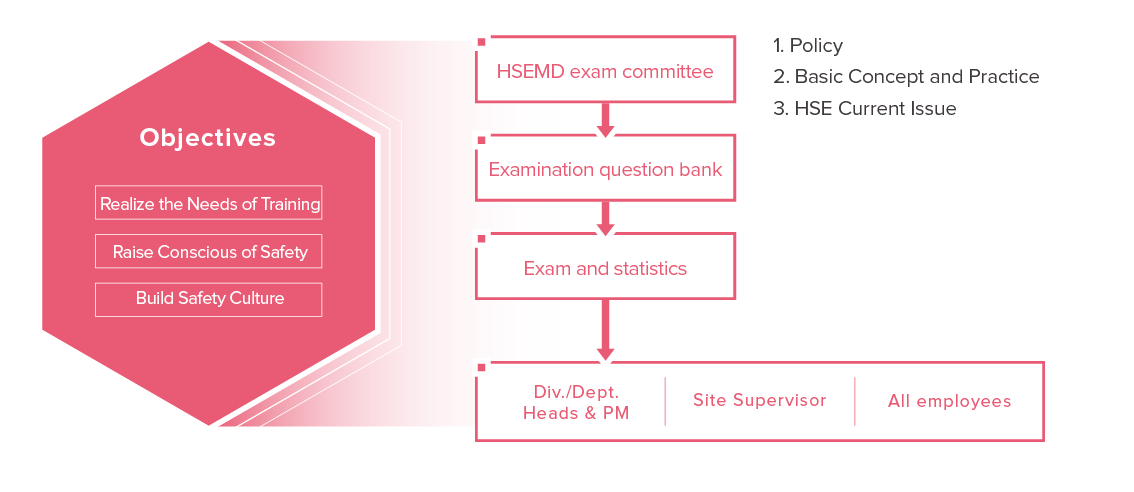

To deeply cultivate the safety culture, CTCI held the Group HSE activities, in response to the National Workplace Safety and Health Week campaign organized by OSHA. Through the soft appeal of the HSE activities, CTCI seeks to exemplify behaviors consistent with corporate culture and to deepen employees' safety awareness. In 2024, CTCI launched a series of group HSE activities, including open letters from senior executives, construction site/plant promotions, HSE fun contests, Group HSE annual meetings, and themed speeches, to raise employees' HSE awareness and recognition and makes it clear that "safety first" is one of the vital conditions for achieving professionalism. Additionally, CTCI has included "safety first" in the criteria in the year-end performance review, reflecting its strong commitment to the value of safety and ensuring that a safety-oriented culture is deeply embedded in every employee’s daily work and actions.

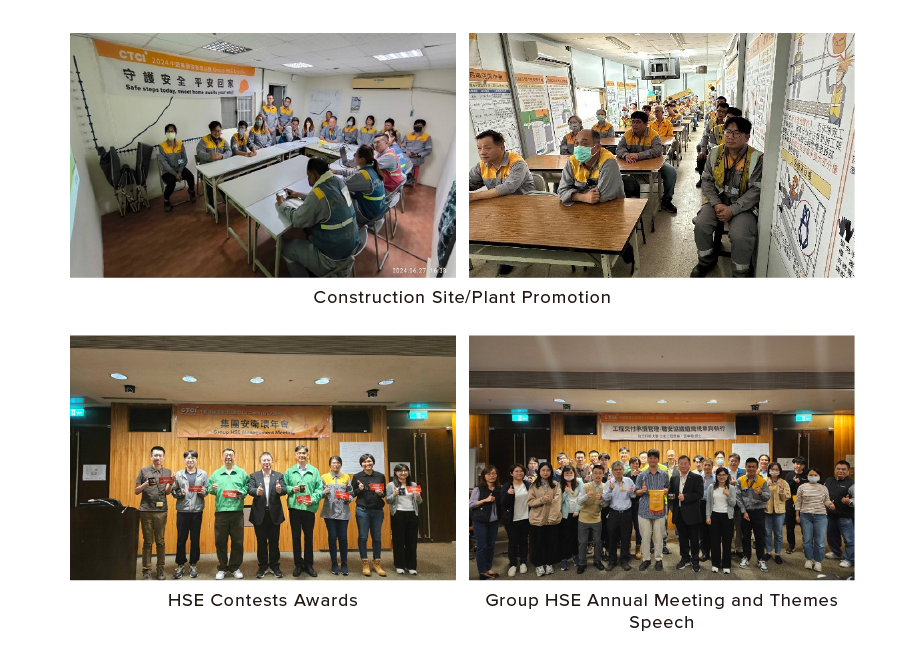
CTCI's commitment to HSE can be seen in CTCI management practices and the projects it manages. Achievements at the first HQ include the ongoing accumulation of safe man-hours (an accumulation of 68,390,914 safe man-hours from January 2007 to December 31, 2024). Many large projects are also expected toward an excellent record of safe man-hours. Among the 15 large-scale projects under construction in 2024 (with a contract value of more than 6 billion), 9 projects exceeded more than 1 million safe man-hours, and the Malaysia P1 project even exceeded 10 million. The remaining projects continue to accumulate safe man-hours due to the progress of the project or the long construction period.
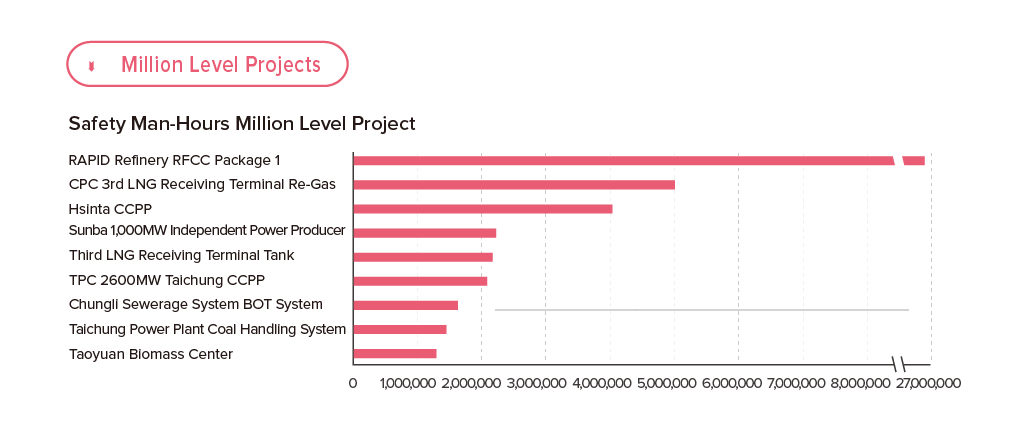
Contractor Management
To promote subcontractors to comply with HSE regulations and the company's HSE requirements, CTCI has developed the "Construction Subcontractor HSE Management Rules." These rules have been formulated to provide clear guidelines for subcontractors to follow during the procurement and contracting stage. In addition, CTCI is constantly developing innovative techniques for managing safety and health effectively. CTCI applies information technology to support routine HSE activities, including the use of the BBS observation APP, which allows workers to report observation records on-site instantly. This approach saves time on data collection and shortens the BBS observation review frequency from once a month to once a week. The instant feedback from the APP is a significant advantage as it enables a quicker response to potential high-risk hazards on the construction site and enhances workers' safety awareness at all times. In addition to promoting paperless and improving efficiency, CTCI has developed the LINE Inspection System, replacing paper-based processes with digital workflows. Through data analysis, the system identifies risk trends, enhances real-time reporting and management efficiency, and optimizes safety and health management for subcontractors. CTCI's safety personnel can use the LINE Inspection System to issue inspection and improvement notices on-site in real time. The system automatically sends these notices to the relevant construction units, and safety personnel or supervisors can track subsequent improvements through the system to ensure that deficiencies are effectively addressed. In the future, CTCI will continue to develop online systems for work permits, automated inspections, and enhance on-site HSE management, and fulfill its ESG goals.
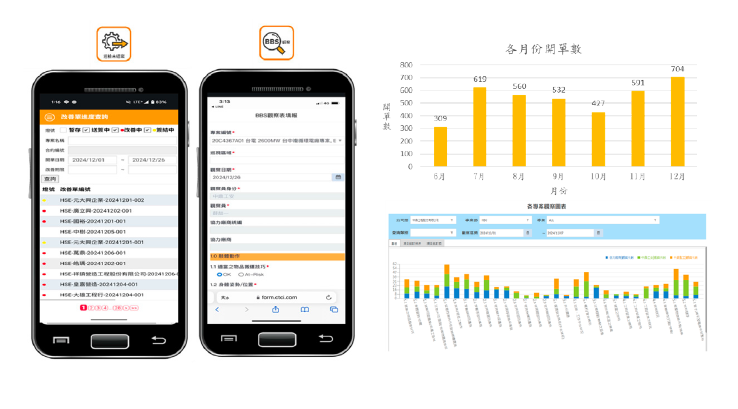
LINE inspection system & BBS observation, and data statistics
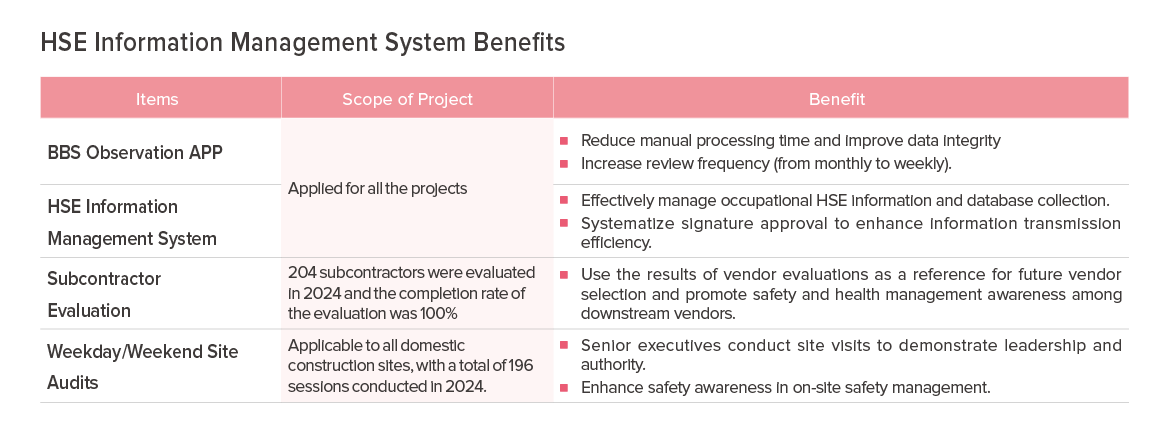
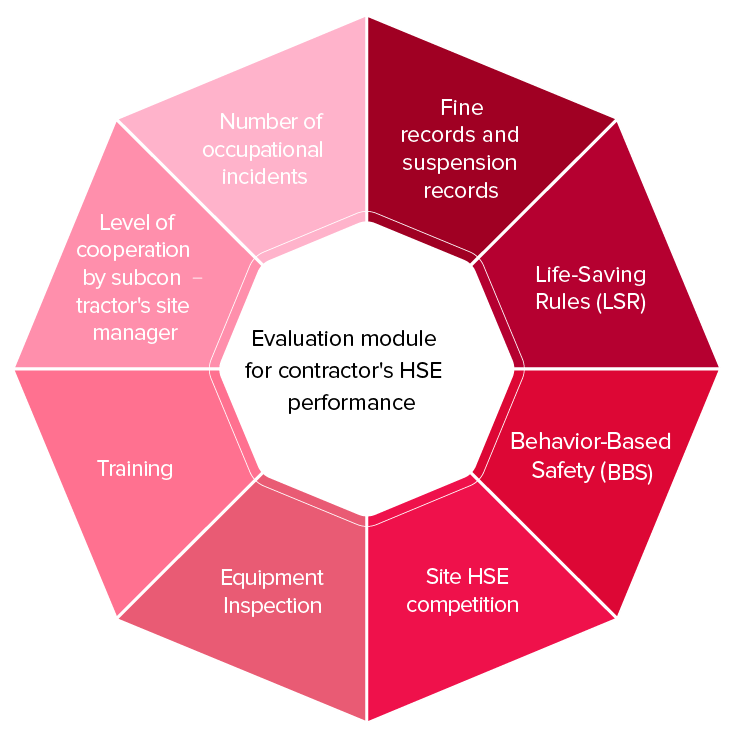
Healthy Workplace
Comprehensive health management
Comprehensive health management includes three major aspects: health examination, health promotion, and health risk management. Through the dynamic integration and continuous improvement of these three components, the goal is to create a safe, healthy, and efficient work environment for employees. The organic combination of these aspects not only improves employee well-being but also enhances corporate competitiveness, achieving a win-win situation for both labor and management. CTCI exceeds regulatory requirements by hiring 10 full-time nurses, 3 contracted labor health practitioners, and 2 contracted physiotherapy practitioners to build a safe workplace and protect the health of employees.
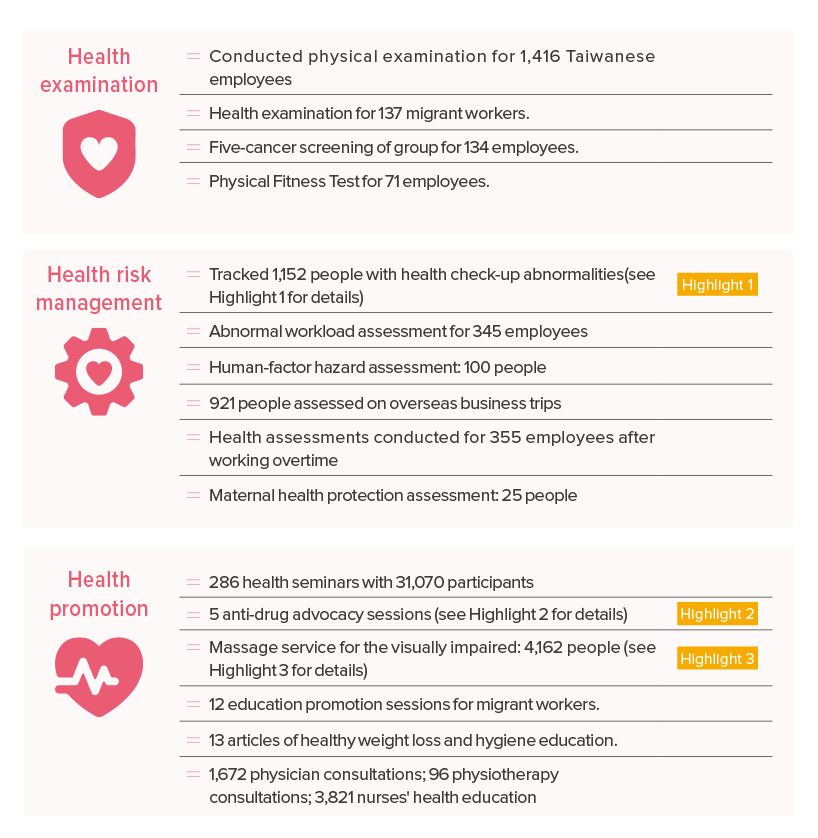
Highlight 1 – Enhanced Health Benefits for a Healthier Future
In consideration of the historical health status of employees and the characteristics of the industry, as well as in response to the domestic trend of super-aged society, the Group significantly adjusted health examination subsidy amounts starting in 2024, with differentiation based on age. This allows Group members to have a diverse selection of health check-up options with more comprehensive support.

Highlight 2 –Anti-Drug Campaign for a Healthier Workplace
Four years ago, the Company initiated a campaign to educate domestic employees, contractors, and migrant workers about drug-related issues. The initiative aims to enhance awareness about drug use and medication safety, and to implement four key actions in the prevention of substance abuse. Through diverse and engaging initiatives such as the traveling exhibition of famous paintings, QR code scanning for famous painting posters, and the "Say No to Drug Demons" traveling exhibition, we aim to interact with our colleagues and enhance their understanding and awareness of emerging drugs.
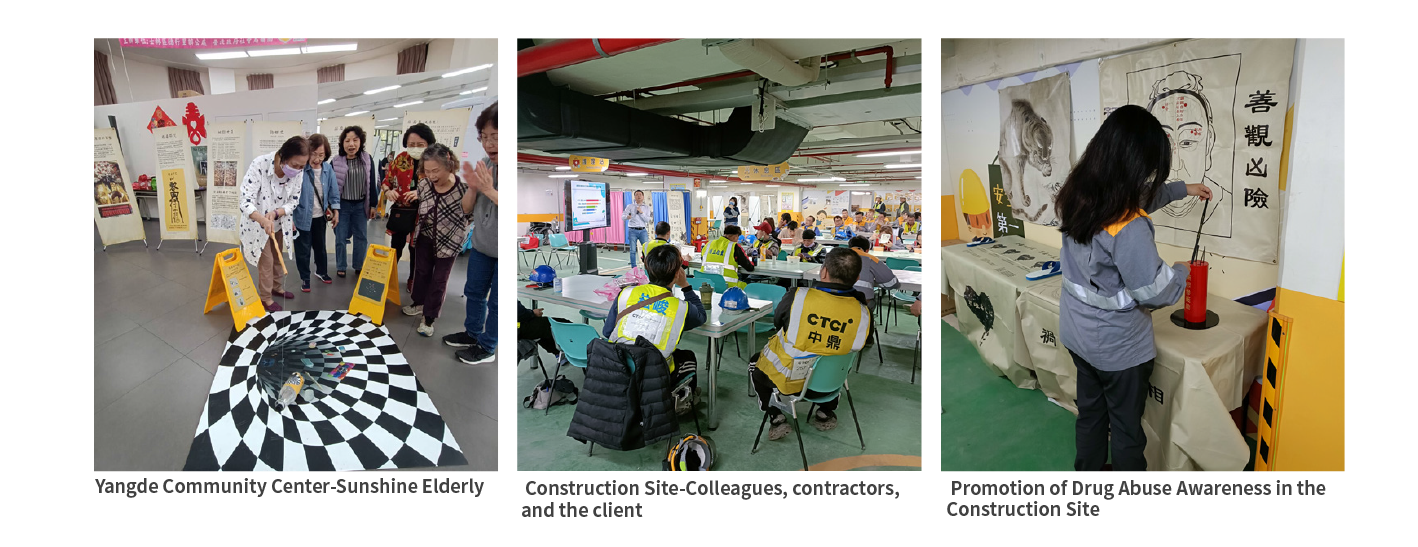
Highlight 3 – Stress-Free Workplace with Full-Coverage Massage Service
As of December 2023, the Company has employed a total of 11 visually impaired massage therapists, who provide stress relief and relaxation services to employees at the first and second headquarters, as well as at various project sites across northern, central, and southern Taiwan, thereby enhancing work efficiency.
CTCI has established Employee Welfare Committee in charge of promoting employee welfare. Budget mainly derives from corporate funding and comprises four categories: general welfare, leisure, educational support, and others. Those who enjoy employee benefits include regular, contract employees and dispatched employees. Total expenditure of employee benefits in 2023 amounted to NT$65,861,114. In addition to members elected from each department, Employee Welfare Committee has an office staffed with two administrators to provide services and consultation.
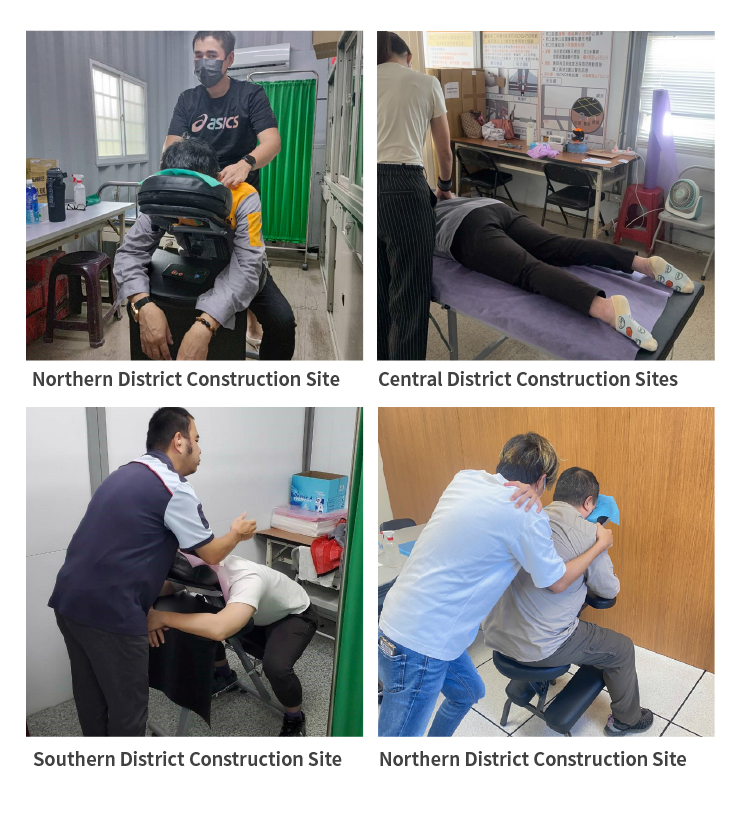
Health Risk Identification and Measures
Health risk matrix: Through the use of the health risk matrix, the incidence and impact of injuries, illnesses, and impacts can be analyzed to identify the health risks of CTCI employees and to formulate health management and mitigation measures.
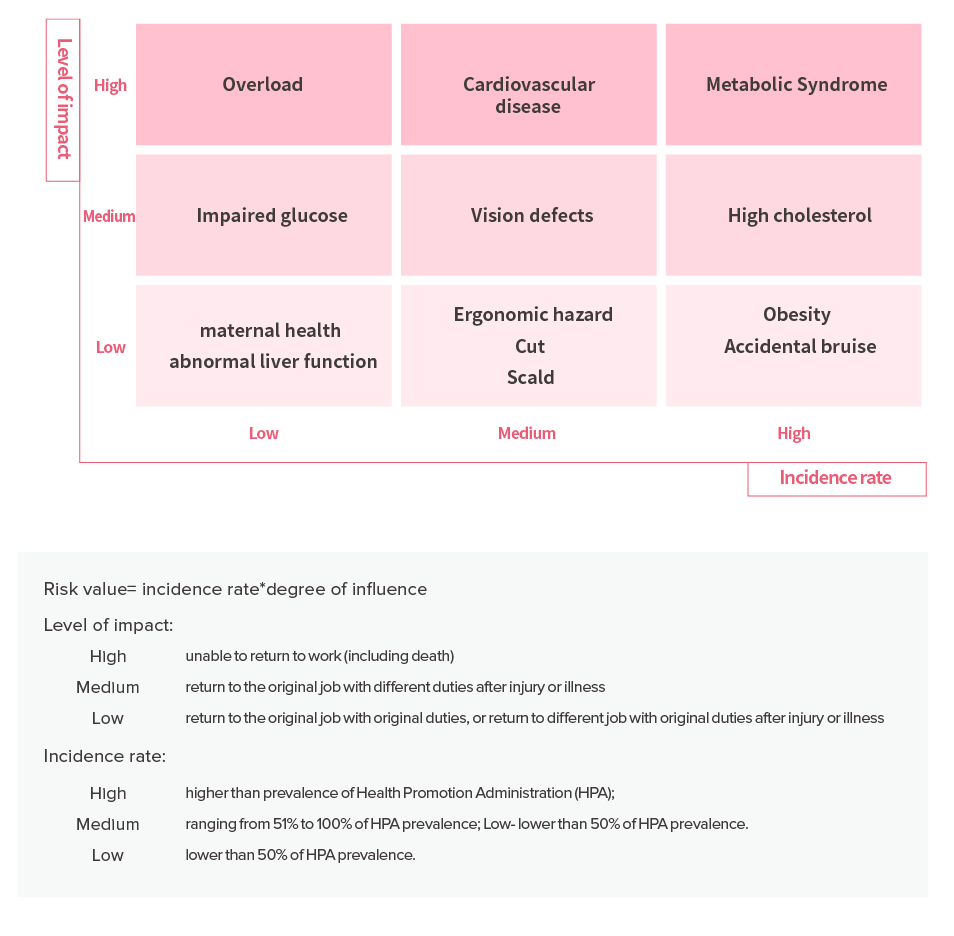
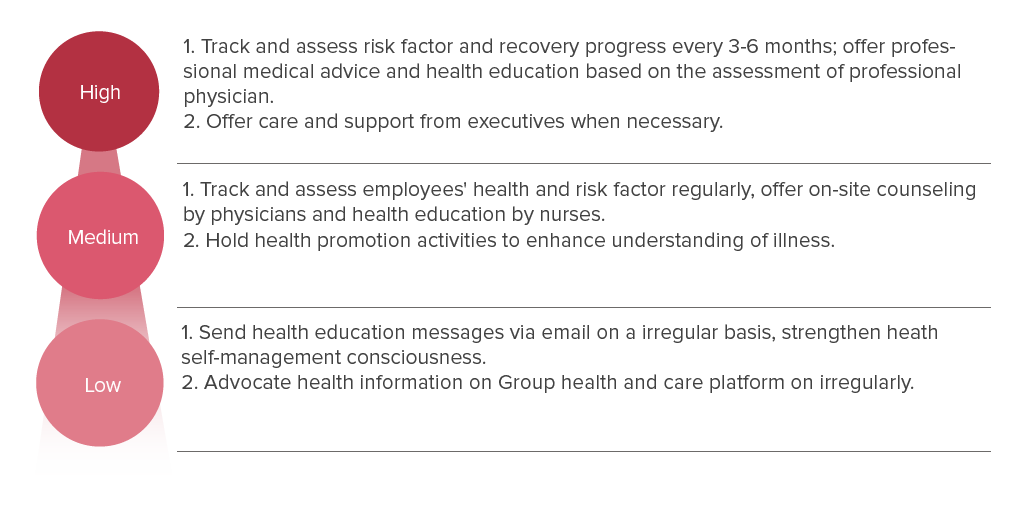
Health Promotion
CTCI is actively establishing a superior healthy working environment and promoting workplace health enhancement measures. In 2024, we continued to maintain certifications such as Healthy Workplace, AED Safe Site, and Excellent Breastfeeding Room. Regarding employee psychological care, we offer employee care assistance, handling of employee feedback (such as improvement proposals, employee complaints, illegal infringements, sexual harassment, and whistleblowing), labor dispute resolution, and labor condition risk assessments (e.g., extended working hours risk assessment). We also collaborate with external institutions to provide professional psychological counseling services, offering psychological consultations to 841 employees in 2024. Additionally, we commission external organizations to manage Employee Assistance Programs (EAPs) to help address psychological distress.
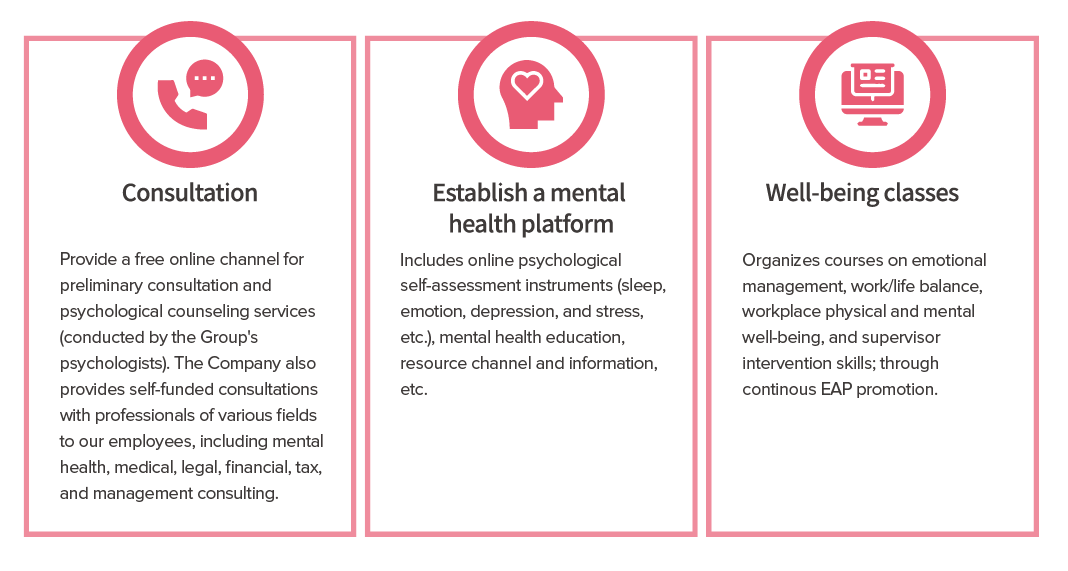
Employee Welfare Committee
CTCI has established Employee Welfare Committee in charge of promoting employee welfare. Budget mainly derives from corporate funding and comprises four categories: general welfare, leisure, educational support, and others. Those who enjoy employee benefits include regular, contract employees and dispatched employees. In 2024, employee welfare expenditures reached NT$106,891,869, setting a new record and demonstrating the company’s commitment to employee well-being. In addition to members elected from each department, Employee Welfare Committee has an office staffed with two administrators to provide services and consultation, ensuring that every employee receives the support they need.
Overview of CTCI Clubs
CTCI has been organized clubs for our employees to relax both physically and mentally. In 2024, with relaxation of the epidemic prevention measures, we organized 16 clubs with various activities such as lectures, courses, and outdoor activities to create a learnig and sharing workplace atmosphere. The operating funds of the association come from the annual budget planned by the CTCI United Vocational Welfare Association. In addition, the clubs can also provide ideas on different activities and creative proposals, and apply for additional subsidies for organizing and participating in various activities. According to the CTCI Club Management Guidelines, clubs that organize activities aligned with any of the 17 United Nations Sustainable Development Goals (SDGs), and clearly indicate the relevant SDGs in their event announcements, are eligible—upon review and approval—for additional funding. This supplementary subsidy amounts to 10% of the activity’s budget, drawn from the annual event budget submitted for that activity, and is provided outside of the club’s original annual allocation. There is no limit to the number of times a club may apply. This policy aims to encourage and support employees in organizing and actively participating in sustainability-related activities. For further details on club activities, please refer to Section “Social Care.”
